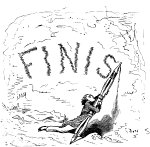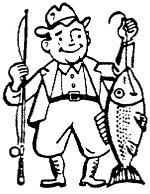Search us!
Search The Word Detective and our family of websites:
This is the easiest way to find a column on a particular word or phrase.
To search for a specific phrase, put it between quotation marks. (note: JavaScript must be turned on in your browser to view results.)
Ask a Question! Puzzled by Posh?
Confounded by Cattycorner?
Baffled by Balderdash?
Flummoxed by Flabbergast?
Perplexed by Pandemonium?
Nonplussed by... Nonplussed?
Annoyed by Alliteration?

Don't be shy!
Send in your question!
Columns from 1995 to 2006 are slowly being added to the above archives. For the moment, they can best be found by using the Search box at the top of this column.
 If you would like to be notified when each monthly update is posted here, sign up for our free email notification list.
If you would like to be notified when each monthly update is posted here, sign up for our free email notification list.
Trivia
All contents herein (except the illustrations, which are in the public domain) are Copyright © 1995-2020 Evan Morris & Kathy Wollard. Reproduction without written permission is prohibited, with the exception that teachers in public schools may duplicate and distribute the material here for classroom use.
Any typos found are yours to keep.
And remember, kids,
Semper Ubi Sub Ubi
|
Aw shucks
Dear Word Detective: I recently read an item in the news where the writer actually constructed the following clause: “it was something to be awed at.” After my head exploded, I started wondering about “awful,” “awkward,” and “awesome.” Is “aw” in these words coming from some common origin, but now used to mean opposite things? — Chris Schultz.
 why go on? I guess it’s because I’ve been writing professionally for long enough to know that there are times when the old noggin just shuts down and you find yourself typing the most appalling things, but my reflex on reading that clause was to start dreaming up excuses for the writer. Perhaps he or she was writing on a subway platform and the train suddenly arrived. Perhaps the silly putz was dictating while skydiving, and wanted to finish the sentence before pulling the ripcord. Burst water pipes, surprise visits from in-laws, and irate tigers are also possibilities. Or perhaps the culprit is just a hack who wouldn’t recognize the vital serial comma in the preceding sentence.
On the other hand, “to be awed at” may strike us as weird and ugly, but it is not, strictly speaking, any more “wrong” than “to be frightened of” or “to be impressed by.” The verb “to awe” simply means “to inspire feelings of reverential wonder and/or fear.” It would, perhaps, be somewhat less jarring to say one is “awed by” something than “awed at,” but, considering that Americans eat twenty percent of their meals in their cars, we probably shouldn’t be too picky.
That verb “to awe” comes from the noun “awe,” which came from the Old Norse word “agi,” meaning “fright or terror,” and first appeared in the 13th century. “Awe” meaning “fear” was so often used in religious contexts, however, that it gradually acquired the meaning of “fear mixed with respect and reverence” toward, for instance, one’s deity. In secular contexts, “awe” came to mean, as the Oxford English Dictionary puts it, “the feeling of solemn and reverential wonder, tinged with latent fear, inspired by what is terribly sublime and majestic in nature, e.g., thunder, a storm at sea.”
Both “awful” and “awesome” are based on this “awe.” The “some” suffix of “awesome” means “causing or characterized by,” and the “ful” of “awful” originally meant “full of” or “characterized by, inspiring.” The transformation of “awful” from meaning “inspiring awe” to “really bad” came in the 18th century, probably from repeated use of “awful” to mean “so bad as to inspire awe.”
“Awkward” is completely unrelated to “awe,” and comes from the Middle English “awkeward,” meaning “in the wrong way” (ultimately from the Old Norse “afugr” meaning “turned backwards”). When “awkward” first appeared in English in the 14th century, it carried the literal meaning of “turned around backwards,” and it wasn’t until the 16th century that the modern meaning of “clumsy,” in both literal and figurative senses, appeared.
Home Sweet Hut
Dear Word Detective: In New Hampshire, Spring doesn’t officially arrive until “ice out” is declared — but we start getting our hopes up for warmer weather when the local news anchors remind us that’s it’s time to bring in the bobhouses for the year. While the local population generally knows what a “bobhouse” is (a portable fishing shanty, placed on a frozen body of water, to protect the fisherman while he/she fishes through a hole in its floor), no one seems to know the term’s origins. Some say it’s from the “bob” on the line that lets the fisherman know he’s hooked something. Some say it’s from the way the shanties themselves might bob a few times before going under, when their owners forget to bring them in off the ice before the Spring thaw. While I haven’t yet heard anyone claim that it’s for some legendary fisherman named “Bob,” I suppose I shouldn’t dismiss that possibility out of hand. I’m actually wondering, though, if it’s from a similar origin as “bobsleigh,” referring to the short runners sometimes mounted on the bottom to make it easier to shift the shanty out on the ice. Can you defrost the history on this one? — Katrina.
That’s an interesting question. I’ve never given much thought to ice fishing, possibly because I grew up next to the Atlantic Ocean, which only freezes every few million years.
 OK, now put me back. I can find no indication that “bobhouse” has anything to do with anyone named “Bob,” although, knowing how people love colorful word origin stories, I’m sure that if anyone ever starts a “bobhouse museum,” an apocryphal “Bob” (perhaps even a “Bob House”) will appear in its brochures.
As for the verb “to bob,” meaning “to move up and down,” a 1954 article cited in the Dictionary of American Regional English confidently traces the term “bobhouse” to just such a motion: “Some fishermen have wire springs that bob up and down, whence the name ‘bob house’.” It’s unclear from that snippet whether the springs are mounted on the houses, the fishing lines, or the fishermen themselves, although I suppose it must refer to the lines. I’m actually very skeptical of this assertion, however. Even if some icefishers did attach springs to their lines, that hardly seems a sufficiently novel practice to determine the name of such an outlandish structure as a tiny hut sitting on a frozen lake. The springs, in other words, are not the story here.
I’d be willing to bet, on the other hand, that your hunch is correct and that the “bob” in “bobhouse” is the same “bob” as is found in “bobsleigh” (or “bobsled”), “bobtail” and a slew of other “bob”-words. This “bob” comes from the verb “to bob,” meaning “to cut short” (as a horse with cropped tail is called “bobtailed”). The verb “to bob” came from the noun “bob,” which originally meant “a bunch, lump or cluster,” possibly from the Irish word “baban,” meaning “cluster” (of grapes, etc.). In the case of “bobhouse,” the term simply means a “bobbed,” i.e., extremely small, house or hut.
Incidentally, the verb “to bob” meaning “to bounce up and down” is considered a separate word from “to bob” meaning “to cut short,” but the two may be related through the noun “bob” in its original sense of “lump.” In English “bob” took on several meanings in the sense of “hanging weight,” including the weight on a fishing line or pendulum. The “bouncing” verb kind of “bob” may well have been inspired by the motion of such “bobs.”
I still have my weird leather helmet.
Dear Word Detective: Where did the word “jerrycan” come from? — Achintyarup Ray.
 Lulu Belle Ah, a succinct question, but one that brings back pungent memories. It was back in 1942, just before the second battle at El Alamein, when our tiny tank Lulu Belle and its crew were marooned in the trackless Sahara. Just me, Humphrey Bogart, Dan Duryea, my pal Frenchie, and a bunch of guys whose names I never caught. We had run out of water the week before and were surviving on six jerrycans of cheap red wine Frenchie had found when the real Jerries (German troops) showed up. Things were pretty hazy by that point, but apparently the Germans were big Bogie fans, so they surrendered toot sweet and we all went home. Then Bogart stole our story and made a movie about it called “Sahara.” Frenchie and I never saw a dime of the loot, but we’ll always have El Alamein.
 Not fair, Bogie. OK, my memory may be playing tricks on me in that paragraph, but there is a direct connection between “jerrycan,” meaning a flat-sided five-gallon metal container usually used to carry or store gasoline, and the German army during World War II. The Germans developed this distinctive type of container early in the war, and considered its design a military secret. After Allied troops captured a few, the British and American forces copied the design and issued millions of the cans to their troops in the field. Since “Jerry” (derived from the word “German”) had been derogatory slang for German soldiers among British troops since World War I, the containers were immediately known as “jerrycans” (or, occasionally, “jerricans”). The genius of the jerrycan was that it could be easily stored, could be carried by one soldier, and, unlike other cans in use at the time, allowed the contents to be poured without a funnel or hose. Jerrycans are still used by many armies and are common in civilian use as well, but are now usually made of plastic.
The “jerry” in “jerrycan” brings to mind two other terms that often cause confusion. We speak of something as being “jerrybuilt” when it is poorly made of inferior materials or constructed in a flimsy fashion. But this “jerry” seems to be unconnected to the slang “German” sense of “jerry,” and “jerrybuilt” dates back to the late 19th century. It’s likely that “jerrybuilt” is connected to an actual person named “Jerry,” perhaps a particularly notorious homebuilder, but the exact source is unknown. “Jury-rigged,” on the other hand, means that something, once broken, has been patched together well enough to work for the moment. It comes from the old naval term “jury-mast,” meaning a temporary, makeshift mast substituted for one broken at sea. The standard theory, although unverified, is that “jury” was originally short for “injury.” This “jury-rig” appears to be completely unconnected to “jury rig” in the “subvert a trial” sense.
The English language being the unruly child that it is, you’ll often hear various “mashups” of these terms, “jerryrig” in particular, and it’s probable that eventually “jury-rigged” and “jerrybuilt” will simply fuse into one term. But for the moment, there remains a shade of difference between the two, as “jerrybuilt” connotes deliberately shoddy work, while “jury-rigged” describes an honest attempt to make do in an emergency.
|
Makes a great gift! Click cover for more.  
400+ pages of science questions answered and explained for kids -- and adults!
FROM ALTOIDS TO ZIMA, by Evan Morris
 
|



 can be found
can be found 







Recent Comments